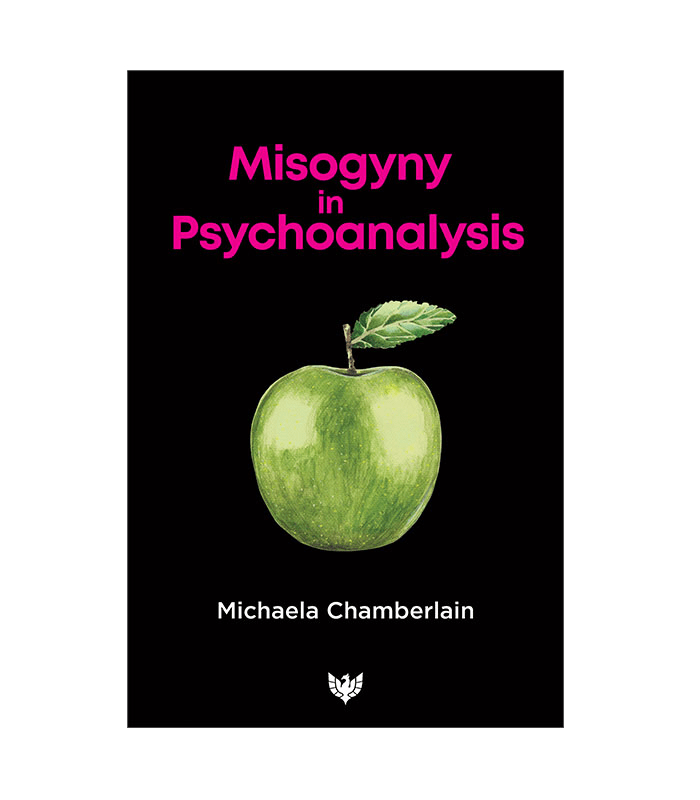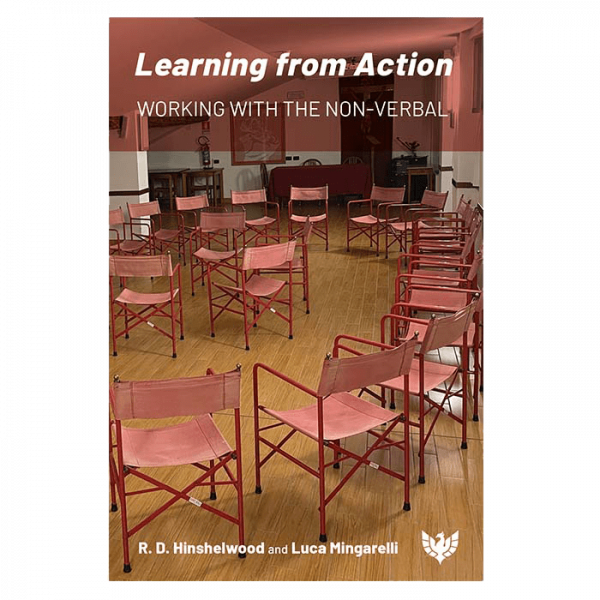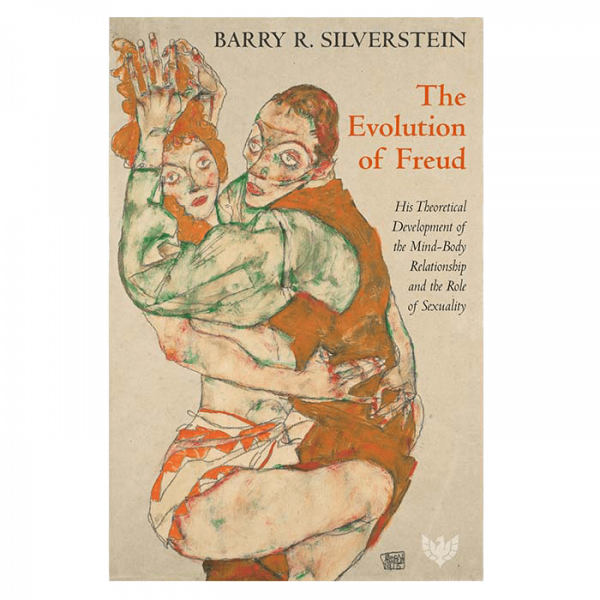In psychoanalysis, misogyny hides in plain sight, seemingly above and beyond the usual conventions of workplace etiquette or even a vague awareness of sexism. It is commonplace in psychoanalytic literature and in the presentation of case studies for a description of the female client’s attractiveness to be given as a diagnosis rather than an opinion, for the word ‘feminine’ to be used as a synonym for submission, for psychosexual development to still miss the glaringly important stage of menstruation, for women to still be described in terms of losing a penis but gaining a baby – not a vagina or clitoris – and for the fundamental experiences of pregnancy and birth to be overlooked. Ironically for a field that’s main currency is reflection, the different treatment of women is bypassed as misogyny is institutionalised in psychoanalysis.
The book reflects the author’s experience in the world of psychoanalysis and psychotherapy as a trainee, supervisee, student, teacher, psychotherapist and supervisor in various institutions, and as a former CEO of a psychotherapy training organisation. It is a collection of five essays inviting you to join an inclusive conversation about why psychoanalysis is the way it is and, through a case study, experience the impact this misogyny has on the treatment of women. Misogyny in Psychoanalysis highlights what’s at risk for the practice of psychoanalysis / psychotherapy and, most importantly, for those seeking help when institutionalised misogyny goes by unchallenged.






Visiting Professor Adam Phillips, English Department, University of York –
‘It seems astonishing that this is the first psychoanalytic book about misogyny, and about the misogyny in psychoanalysis. It is fortunate that this is such a remarkable book, lucid, incisive and accessible: and essential now to the theory and practice not only of psychoanalysis, but to all the psychological therapies.’
Professor Gina Heathcote, School of Law, Gender and Media, SOAS University of London –
‘This important book is a must-read for analyst and lay-person alike, providing a detailed and careful analysis illustrating why psychoanalysis as both a field of research and as a practice has a persistent blind spot when it comes to misogyny. In equal parts engaging and informative, Michaela Chamberlain draws in narrative, art, personal experience, and her detailed knowledge as a psychoanalyst to shake at the canon and ask, in eloquent yet forceful terms, for the need for psychoanalysis to take itself to the couch and examine the legacy of Freud’s misogyny that continues to infiltrate the field. As a gender studies reader, I found the book both accessible and enlightening on the ways through which women’s sexuality and mothering continue to be defined from a position of retrograde knowledge on women’s lives, anatomy, health, and consciousness. From menstruation to mothering and academic life, Chamberlain has provided a text that will reverberate for readers in significant and lasting ways.’
David Morgan, Consultant Psychotherapist, psychoanalyst, and editor of the Political Mind series –
‘Psychoanalysis can become a psychic retreat so as to avoid our own blind spots. We are all steeped in our respective eras with all the inherent defensive certainties that this social and political rootedness can engender. This has clearly been the case in relation to misogyny. It has taken some courage to write this challenging and well-crafted book. It will also require courage for male analysts to recognise themselves within it.’
Anouchka Grose, Centre for Freudian Analysis and Research –
‘This is a brilliant, necessary book – so well written and argued. I tore through it in one sitting. The case material is illuminating and overall the book manages to be critical of psychoanalysis while remaining at all times psychoanalytic. A real achievement.’
cstamou (verified owner) –
Current, relevant, insightful, and acutely observed account of the impact of unexamined misogyny in the psychoanalytic field and beyond, laid out in an accessible, daring, bold and courageous manner. Michaela Chamberlain leads the way we should be having these difficult conversations, calls out the elephant in the room, and interrupts us when we turn a blind eye as an attempt to give in to convention, habit, and uncertainty. After all, as psychoanalysis has shown time and time again, it is through exposing difficult thoughts that we get to understand their root cause and find a way to work through them.
Amazon review – Robert Kramer, July 2022 –
5/5 stars: The war on women waged by psychoanalysts
Michaela Chamberlain has written the most important book on the culture of psychoanalysis since Ernest Gellner’s masterpiece, “The Psychoanalytic Movement: The Cunning of Unreason.” Her book becomes an instant classic.
Forget all the deceptive talk by analysts who insist that, already long ago, they eliminated Freud’s misogyny from the practice and teaching of analysis.
Not so.
Chamberlain shows this claim to be deliberate deception of the public or, at best, self-deception. Not much has changed in analytic institutes since Freud came up with his bizarre theory of penis envy.
Psychoanalysis, notwithstanding the predominance of women in the field, remains misogynistic in its unconscious because Freud built his movement on the basis of a war against women.
The analytic institutes are still run essentially by men who seem to spend a considerable portion of their time admiring their own penises, and asking their women patients to admire them as well, while paying no attention to issues like menstruation, pregnancy and menopause.
Unfortunately, Freud is not dead.
The worst of Freud lives on.
Read this book for a breath of fresh air.
Professor Tony Attwood, clinical psychologist, specialist in Autism Spectrum Disorders –
‘I really enjoyed reading the chapter ‘The misogynistic introject – a case study’ and thoroughly endorse your perception of how psychoanalysis assumes that it is a fault in the mother that creates autistic characteristics, and if not creates, then potentially amplifies. I am sure that you will be contacted by many mothers who resonate with the descriptions. My feedback is one of gratitude to you for writing the chapter and I know that mothers will support you. I only hope that analysts recognise the misogyny in psychoanalysis.’
Debbie Zimmerman, attachment-based psychoanalytic psychotherapist, ‘New Psychotherapist’ –
‘This long overdue book jolts us forcibly and necessarily out of our collective dissociative blindness. It rips away the veil of the ‘misogynistic introject’ of our unwillingness/inability to see what is (quoting the author) ‘hiding in plain sight’, throwing into stark relief and forcing us to confront the glaring misogyny and patriarchal foundations and their continuing pervasiveness in our field. […] this book is a page-turner which had me riveted from beginning to end.’
Joanna Ryan, psychoanalytic psychotherapist, ‘British Journal of Psychotherapy’ –
‘This book is a monograph of passionate critique concerning the forms of misogyny to be found embedded in various psychoanalytic concepts, theories, practices and institutions. The book’s brevity, Michaela Chamberlain says, is to render it accessible to anyone with an interest in psychoanalysis. It is welcome to have a renewed focus on misogyny and to be reminded once again of its persistence and insidiousness.’
Debbie Zimmerman, attachment-based psychoanalytic psychotherapist, ‘New Psychotherapist’, Autumn 2022 –
‘[Chamberlain] eloquently interweaves her experience as a woman, psychotherapist and supervisor with meticulous research and critical analysis of misogyny in psychoanalytic theory and its practice – as well as its enactment and perpetuation in the communities and organisations in which we work and live. […] This is also an engaging and sometimes moving read. Chamberlain powerfully conveys her sense of shock, pain and deep frustration at witnessing some glaring examples of misogynistic thinking. […] This book is groundbreaking in the iconoclastic treatise which lies at its heart, the courage with which the author takes on the psychoanalytic establishment itself.’
Annie Pesskin, trained at the BPF, works in private practice, and is the author of The Kids Are Crying Again: Emergency Communication Skills for Parents and Partners –
‘It seems more important than ever that we face up to the legacy of misogyny in psychoanalysis, so that we do not pass it on to the next generation. Michaela Chamberlain has started a really important conversation. It is up to all of us to keep talking.’